A brief introduction of some famous musical instruments
Madal
Madal
is one of the famous folk musical instruments associated with our
culture and lifestyle. It is believed that it was first introduced by
the Magar community, it is equally famous and used by almost all of the Nepalese society.
This
instrument is made especially with skin stretched over both of the ends
of a wooden hollow tube and tightened with leather strings. Madal is
drum played by hand beating on both sides. The madal has a strand that goes around the waist of the person playing it to hold it horizontally. Playing
technique involves rhythmic struck one either ends (heads) with palm.
The heads vibrate to produce sound when struck. It is mostly used in
Nepali folk song. No one can still stand when people start, beating
madals singing Nepali folk song (Nepali lok geet).
Sarangee
Sarangee
is a traditional folk musical instrument especially played by
Gandharva. It is a popular string-instrument made of a piece of wood,
the bottom of which is made a hollow and four pieces of strings are
fastened tightly with four wooden nails fixed on the top of it. It is
played by rubbing on a group of strings especially left and right
repeatedly with a small stick, which is fastened with some strings.
Sarangee resembles the violin in western culture. Sarangi in Nepal is
played from so many years. It has its own famous rhythms and tones.
Sarangi in Nepal has been used as a instrument used to convey the
message and news across t he
country. The Gandharvas used to travel across the nation and go home to
home sing the song of current affairs and earn some money. That was
kind of messenger tradition.
he
country. The Gandharvas used to travel across the nation and go home to
home sing the song of current affairs and earn some money. That was
kind of messenger tradition.
Basuri and Murali
These are made from pieces of bamboo by making generally 6 holes on it. The six holes represent the musical notes. Both
of these instruments are similar in nature and played by blowing air
through mouth. A little difference between these two is that Murali is
played like flute/trumpet holding by lips and slops downwards whereas the Basuri is
kept horizontally (exactly how lord Krishna played in Mathura and
Brindavan) . Both of these instruments produce almost same types of
sound. These are also famous all over the country. In eastern culture
flute represents lord Krishna. The names Murali and Basuri are synonyms
and used alternately in some languages.
flute/trumpet holding by lips and slops downwards whereas the Basuri is
kept horizontally (exactly how lord Krishna played in Mathura and
Brindavan) . Both of these instruments produce almost same types of
sound. These are also famous all over the country. In eastern culture
flute represents lord Krishna. The names Murali and Basuri are synonyms
and used alternately in some languages.
Panchai baja
Panche
baja is called so because it is the group of five musical instruments
played together. The five musical instruments in panche baja are.
Jhyamta/Jhurma (Cymbal): It is one of the Panchhai Baja. It is a couple of flat round dish-like musical instrument made of brass or bronze, played by beating on each other.
Narsingha (A Trumpet): It is one of Panchaibaja Bajas made of two pieces curved copper tube that is played by blowing air through its mouthpiece.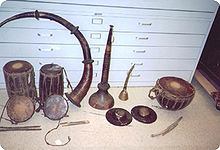
Nagara/Damaha (A Drum):
It is also one of the panchhai Baja. It is made of leather stretched
over an end of a hollow copper bowl played by hitting with hands or
sticks.
Sanai (A kind of clarinet):
It is one of the Panchhai Baja. It is made of a metal shaped like a
pipe slightly bent forward has couple of holes, reed on the top that you
blow into.
Tyamko:
It is also one of the Panchai Baja. It is similar to Damaha in shape
but very small in size, played with two pieces of sticks called Gajo.
Khainjadi (A tambourine)
It is a kind of small drum made of skin stretched over an edge of a rounded hollow wood. It is played especially on the occasion of singing a kind of song called Roila and Balam.
played especially on the occasion of singing a kind of song called Roila and Balam.
Pungi (Bin)
It is made of a harder cover of coconut by fixing some pieces of bamboo on it. It is specially played by snake charmers to make snakes dance especially in Terai regions.
Shankha
It
is a shell of sea creature. It is played by blowing air on the occasion
of worship and funeral procession. Most of Hindu ritual starts with the
sound of Shankha. Sankha is not the regular musical instrument to play.
It is only used in ritual events.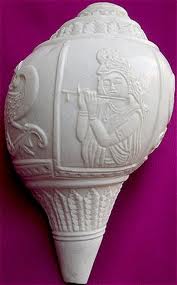
Tunga
It is one of the popular musical instruments in mountain region. It is made of a piece of  rhododentron wood by fastening strings as in Sarangi.
rhododentron wood by fastening strings as in Sarangi.
Yalamber
A popular instrument in Kirant community which is made of two pieces of string fastened on a piece of bamboo.
Ek Tare
It is a single-string instrument. Especially, it is played by Santas (ascetics) and Yogis. It is a believed to be the early type of the musical instrument Sitar.
be the early type of the musical instrument Sitar.
Urni
It
is played especially by Dhimal Community made of outer hard cover of
the coconut by stretching leather and fastening a string with a rod.
Dhol or Dholak
It is a kind of large drum like a Madal made of a hollow wood by stretching 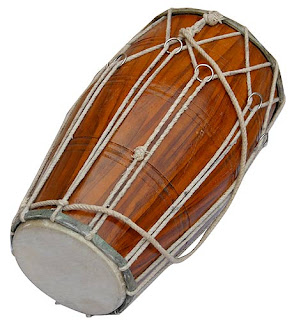 leather over both of the edges and played with hands. This is mainly played in Madhesh. This is also a kind of Mridangan. Dholak is played throughout Nepal especially in Holi, and to celebrate birth of child and to welcome harvesting.
leather over both of the edges and played with hands. This is mainly played in Madhesh. This is also a kind of Mridangan. Dholak is played throughout Nepal especially in Holi, and to celebrate birth of child and to welcome harvesting.
Dhyangro
It is a type of drum made of hollow wood by stretching leather both of its edges and played with a curved stick called Gajo. It is specially used by faith healers (Dhami/Jhakri) on the occasion of worshiping or treating people. This is a traditional medical treatments prevailing in Nepal.
Hudko
It is popular in Kirant community made of a kind of bamboo. A piece of bamboo is curved and a small thread is fastened on it.
fastened on it.
Murchunga
A kind of musical instrument made of piece of iron. It is played by plucking its metal wire reed with fore finger being gripped between the teeth. It is also popular to Kirant, produces sound like Binayo.
Masak
It looks like a Sarangi, which is popular in Bajhang area.
Dafali
It is popular in western Terai region, which is made of by stretching leather over an edge of a circled wood or
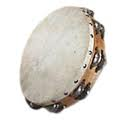 metal.
metal.
Pung
It is made of horn of ox and popular in Kirant community especially in Solukhumbu district.
Dakkari
A popular musical instrument in Mithila region is made of wood joining six strings on it.
Dhamphu
It is a popular musical instrument especially in Tamang community. It is made of hollow wood stretched by leather over one edge looks like a small drum.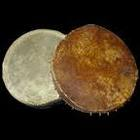
Irlung pipari
It is made of horns of Krishnasaar (black antelope)
and used to produce sound blowing into. It is especially used by Jogis
blow around the houses of people believing that there will be no harm
from evils.
Comments
Post a Comment